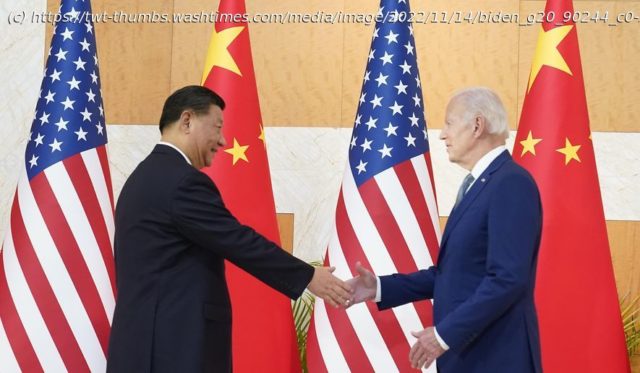Array
ANALYSIS
President Biden and Chinese President Xi Jinping presented sharply diverging views on the future of U.S.-China relations during three hours of closed-door talks Monday. And the dynamic of the meeting, preceded by a warm handshake, quickly became clear: The American president sought a return to greater bilateral engagement while the Chinese leader bluntly warned the United States to back off and not to cross its “red lines” regarding Taiwan and other issues.
According to the official White House readout, Mr. Biden emphasized avoiding conflict with what critics says in an increasingly aggressive China. The message: Washington does not want a “new Cold War” in Asia and is seeking to turn down the temperature through more talks and re-engagement aimed at easing tensions.
But Mr. Xi, for his part, said the world is facing an historical turning point and demanded the United States accept China’s communist system and his drive to rejuvenate the nation.
The Chinese leader bluntly warned the United States that resolving differences over Taiwan remains a key flashpoint for a potential future conflict, the Chinese government said in a statement.
According to post-meeting statements from both sides, the talks were notable at times for what was not raised, including topics that might have made the Chinese leader uncomfortable. Neither the U.S. or Chinese statements mentioned whether the talks addressed the controversy over China’s role in the handling of the COVID-19 pandemic and Beijing’s years-long stonewalling of international investigations into finding the virus’ origin.
China’s large-scale military buildup — in particular the rapid expansion of its nuclear missile arsenal — also were not mentioned as a topic of discussion for the two leaders during some three hours of talks on the sidelines of a regional economic summit in Bali, Indonesia.
World events beyond the bilateral relationship also clouded the meeting. The commander of the U.S. Strategic Command, Adm. Charles Richard, said earlier this month that the Ukraine war could be a prelude to a major conflict with China over Taiwan.
According to the White House, Mr. Xi and Mr. Biden agreed that nuclear war should not be fought and cannot be won. They also opposed threats by Russia to use nuclear arms in Ukraine.
“President Biden explained that the United States will continue to compete vigorously with the PRC, including by investing in sources of strength at home and aligning efforts with allies and partners around the world,” the White House said in a readout statement of the talks using the acronym for People’s Republic of China. Mr. Biden told the Chinese leader that U.S.-China competition must not “veer into conflict” and should be managed and discussed in open lines of communications.
During a post-meeting press conference, Mr. Biden said tensions should lead to a new Cold War.
“We were candid and clear with one another across the board,” Mr. Biden said. “And I do not think there’s any imminent attempt on the part of China to invade Taiwan.” U.S. policy toward Taiwan “had not changed at all,” he insisted.
Mr. Biden has said on four occasions that the United States would defend Taiwan from a Chinese attack, a policy suggested by the 1979 Taiwan Relations Act.
“I made it clear that we want to see cross-strait issues peacefully resolved…, and I’m convinced that he understood exactly what I was saying.






